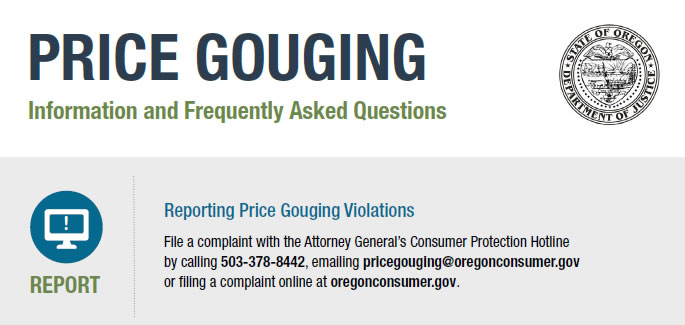 Price Gouging Handout (English | Russian | Spanish)
Price Gouging Handout (English | Russian | Spanish)
Frequently Asked Questions
- Open All
-
What is price gouging?
- In Oregon, it is unlawful to offer or sell essential consumer goods or services at an “unconscionably excessive price” after the Governor declares that an abnormal disruption of the market exists.
-
Who is covered by Oregon’s price gouging law?
- The law covers merchants (retail businesses) and wholesalers that sell essential consumer goods or services. The law does not cover non-merchants, public bodies or most utilities.
-
Which products or services are “essential consumer goods or services”?
- A good or service is an “essential consumer good or service” if it can be acquired by consumers and is necessary for health, safety, or welfare. Examples include food, water, fuel, construction materials, medical supplies and services, and hotel rooms. Whether a consumer good or service is essential may depend on the emergency. For example, items such as cleaning supplies, hand sanitizer, and toilet paper are necessary to protect the health, safety and welfare of consumers during the COVID-19 outbreak.
-
When is a price “unconscionably excessive”?
- On its face, a price is unconscionably excessive if it is 15 percent or more higher than either (1) the price the merchant sold the same item for immediately before the market disruption commenced, or (2) the price the same or similar goods sold for in or near the area covered by the declaration immediately before the market disruption commenced.
-
Are there exceptions to price gouging, and if so - what are they?
- Merchants and wholesalers are prohibited from increasing their prices 15% or more above the amount immediately prior to the governor’s declaration. However, it may not be considered price gouging if the increase is attributable of any of the following:
- Additional costs imposed by suppliers.
- Added expenses for the business to procure the essential goods or services due to the emergency. For example, the supplies had to be airlifted into an otherwise inaccessible area.
- Increased internal costs or expenses related to the declaration such as overtime pay, additional staff, security, distribution, etc.
-
What can I do if I suspect price gouging?
- If you suspect price gouging, try to get as much information as possible before reporting. Take a picture of the posted price, advertisement or online listing. If you are in a store, take a picture of the item and note the product name, brand, size or quantity, and unit price. If you are shopping online, take a screenshot of the listing or note the online platform, seller name, date, and all of the product information, including price. Keep your receipt if you purchase the item. Report suspected violations to the Attorney General’s Price Gouging Hotline at (503) 378-8442 or submit a complaint online at oregonconsumer.gov and attach your pictures, receipt or other information.
